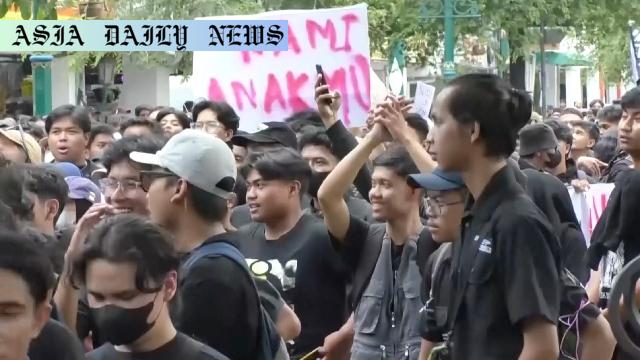Budget Cuts: University students in Indonesia protest $19 billion budget cuts fearing negative impact on education funding and policies.
Budget Cuts spark nationwide protests among Indonesian students.
Concerns focus on the impact on education and military spending.
Students demand evaluation of costly free meal programs.
The government is reviewing the demands, with a response expected by Saturday.

Massive Protests Erupt Over Controversial $19B Budget Cuts
Nationwide Protests Shake Indonesia
In a striking show of unity and determination, university students across Indonesia staged massive protests on Thursday under the banner “Dark Indonesia.” These protests arose in reaction to sweeping budget cuts of 306 trillion rupiah, equivalent to approximately $19 billion, introduced by President Prabowo Subianto’s government. The decision, which mandates ministries and local governments to slash funding, has resulted in widespread concerns, especially about its potential to severely impact education spending.
Fears Over Educational Impacts
One of the primary concerns of the protesters is the possible reduction in education budgets. Many students believe such measures could thwart progress in education quality and accessibility. Education is foundational to building a skilled workforce and fostering innovation, so it’s no surprise that university students, who directly experience the ramifications of such cuts, are voicing strong opposition. While the government claims the cutbacks are partly aimed to fund a free school meals program—a key promise of Prabowo’s administration—students question its effectiveness and efficiency.
Free Meal Program Under Scrutiny
The free school meals program has been a cornerstone policy of President Prabowo’s government, but it has not been without controversy. Protesters assert that this initiative is riddled with inefficiencies and incurs high costs, diverting critical resources away from other key sectors, particularly education. A student who spoke during the protests emphasized the need to evaluate the program thoroughly, to ensure that it delivers meaningful results and prevents further financial strain on the state budget.
Nine Demands Submitted to the Government
During the rallies, the students submitted a list of nine demands to State Secretary Minister Prasetyo Hadi. Chief among these demands are a call to critically evaluate the free meal program, address transparency concerns, and halt policies that could expand military influence in civilian spheres. Their message is clear: These budget cuts and policy shifts must serve the nation’s best interests without undermining critical sectors like education or causing undue harm to the broader socio-economic framework.
Government’s Response to Protesters
Responding to the demonstrations, Minister Prasetyo Hadi remarked that the government will review these demands and maintain open communication. However, the clock is ticking—a response is expected by Saturday. This deadline adds urgency to the government’s deliberations, as failure to address the students’ concerns might lead to expanded demonstrations and greater public unrest. The situation underscores a growing political battle between youth movements and state authorities, highlighting broader concerns about governance and fiscal responsibility in Indonesia.
The Bigger Picture: Political and Economic Implications
This episode sheds light on the delicate balance that leaders must strike between implementing campaign promises and managing public sentiment. President Prabowo’s budget cuts serve as a double-edged sword: on one hand, demonstrating the administration’s commitment to promises like free school meals, while on the other hand, raising fears about financial mismanagement and misplaced priorities. It also reveals how vital transparency and open discourse are in addressing policy disagreements, especially those involving younger generations.
Looking Forward
As the government deliberates its response, the stakes remain high. The “Dark Indonesia” protests symbolize not just dissatisfaction with a single policy but also a broader need for inclusive decision-making that takes into account the voices of affected demographics. How Indonesia navigates this contentious issue will shape not only the immediate political landscape but also the confidence of its citizens in their leaders’ ability to govern wisely and effectively.



Commentary
Listening to the Youths’ Concerns
The “Dark Indonesia” protests mark a significant moment in Indonesia’s political discourse. It is heartening to see students taking on the mantle of activism, demonstrating their commitment to holding their leaders accountable. While their concerns about budget cuts impacting the education system are valid, the broader implications of this movement go beyond the policies in question. They stand as a representation of the growing frustration among young people about decisions made without their input or consideration.
Balancing Policy and Reality
President Prabowo’s administration faces a tough challenge: honoring campaign promises like the free meal program while ensuring that essential sectors like education are not neglected. The students’ critique of the meal program offers a reminder that well-meaning initiatives must also be practical and efficient. There’s merit in their request for greater transparency and evaluation to guarantee that public funds are being utilized optimally.
A Defining Moment for Governance
The government’s handling of these protests will likely set a precedent for future interactions with citizen activists. By engaging constructively with the students and addressing their concerns openly, Minister Hadi has an opportunity to demonstrate leadership and bridge the growing divide. Dismissing this movement, however, could result in long-term discontent and erode public trust in the administration’s ability to govern inclusively.
The Road Ahead
As we watch this situation unfold, it is a reminder that inclusive governance is not a lofty ideal but a necessity for a thriving democracy. The students’ call for action should serve as a wake-up call—not only for Indonesia but for governments worldwide. Public policies must align with the needs and aspirations of the people they affect. How Indonesia handles this pivotal moment could well define its trajectory for years to come, with the youth leading the charge for a more accountable and transparent system.